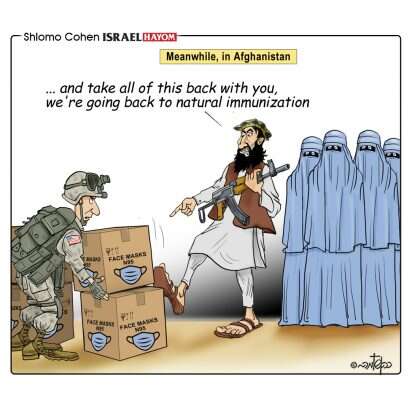An Afghan stain on the American flag
Prof. Abraham Ben-Zvi
Israel Hayom
August 17, 2021

At first glance, the rushed American withdrawal from Afghanistan, weeks before the target date, and the rapid takeover of the country - including the presidential palace in the capital, Kabul - holds within it a true paradox.
After all, the American eagle experienced a similar traumatic experience in late April 1975, when it ignominiously fled in the face of the all-out attack of the North Vietnamese army and the Viet Cong against the United States' South Vietnamese ally, which within a short time led to the fall of the capital, Saigon, and the reunification of the country under communist rule.
The US was supposed to have learned the lessons of the futility of ongoing low-intensity conflict with a zealous and determined ideological enemy, far in its worldview and behavioral patterns from the American "operational code". Moreover, its prior knowledge of the Afghan arena should have lit a glaring warning light before it even launched its direct military operations in this heart of darkness in October 2001.
Two decades before the current chapter of American military involvement in Afghanistan had begun, against the backdrop of the Soviet invasion of the country in December 1979, US military advisers were being sent to Pakistan, which had become the forward base of the mujahideen forces that the US had founded, equipped and trained to fight the Soviets (this indeed played a decisive role in the humiliating defeat suffered by the Kremlin, and its withdrawal from Afghanistan after a decade of failures and bloodshed.
Despite the American familiarity with the Afghan experience with all its tribal, ethnic and religious divisions, and even though it had supposedly gained experience in managing low-intensity conflicts on the Afghan front against Soviet regular forces, Washington did not draw the conclusions. Thus, the US walked directly into the Afghan killing fields out of the naive belief that it would be possible to establish there, in lightning speed, the fundamental values and institutions of Western democracy and turn Afghanistan into a stable and functioning national state in the spirit of the American dream and tradition.
Just as America in the 1960s tied its fate up with the corrupt Saigon regime, America in the 2000s continued to maintain o-called "special ties" with the corrupt government based in the Afghan capital - a government that failed to pose any real challenge to the radical and militant Taliban.
In this context, we must not forget that it was then-Vice President Joe Biden who represented within the Obama administration the most naive position of all - that a functioning coalition between the Kabul government and the Taliban was an achievable goal.
Biden took his almost mystical belief in there being a "solution to every problem" and that it is always possible to find the redeeming equation that will enable the formulation of practical and pragmatic solutions to even the most complex disputes and copy-pasted it directly from the internal American dimension straight to the Afghan battlefield, where the Western concepts of compromise and "equitable agreements" were and remain completely alien.
In view of this ongoing march of delusion and inability to understand the nature of cultures where radical actors rule - a march that began in Vietnam and ends in Afghanistan – the question to be asked is what will the regional implications be of the current collapse (which is taking place at the same time as the United States continues with its gradual disengagement from Syria and Iraq)?
Although it is too early to draw clear cut conclusions from the difficult and embarrassing sight of a superpower fleeing without any honor from an arena where it lost 2,400 soldiers, one can assume that the moderate Sunni world on the one hand, and Israel on the other, will in the near future re-evaluate the credibility of the American Gulliver, who today looks more like a paper tiger.
Indeed, in view of the priorities of the Biden administration, which has put aside the international arena (with the exception of China) the question is not only what will be the fate of the Abraham Accords at a time when the American patron is no longer capable of providing a safety net to its "client states," but also whether other central actors in the international system (headed by Moscow and Beijing) will try to challenge the American Gulliver, who is currently tied down.

No comments:
Post a Comment